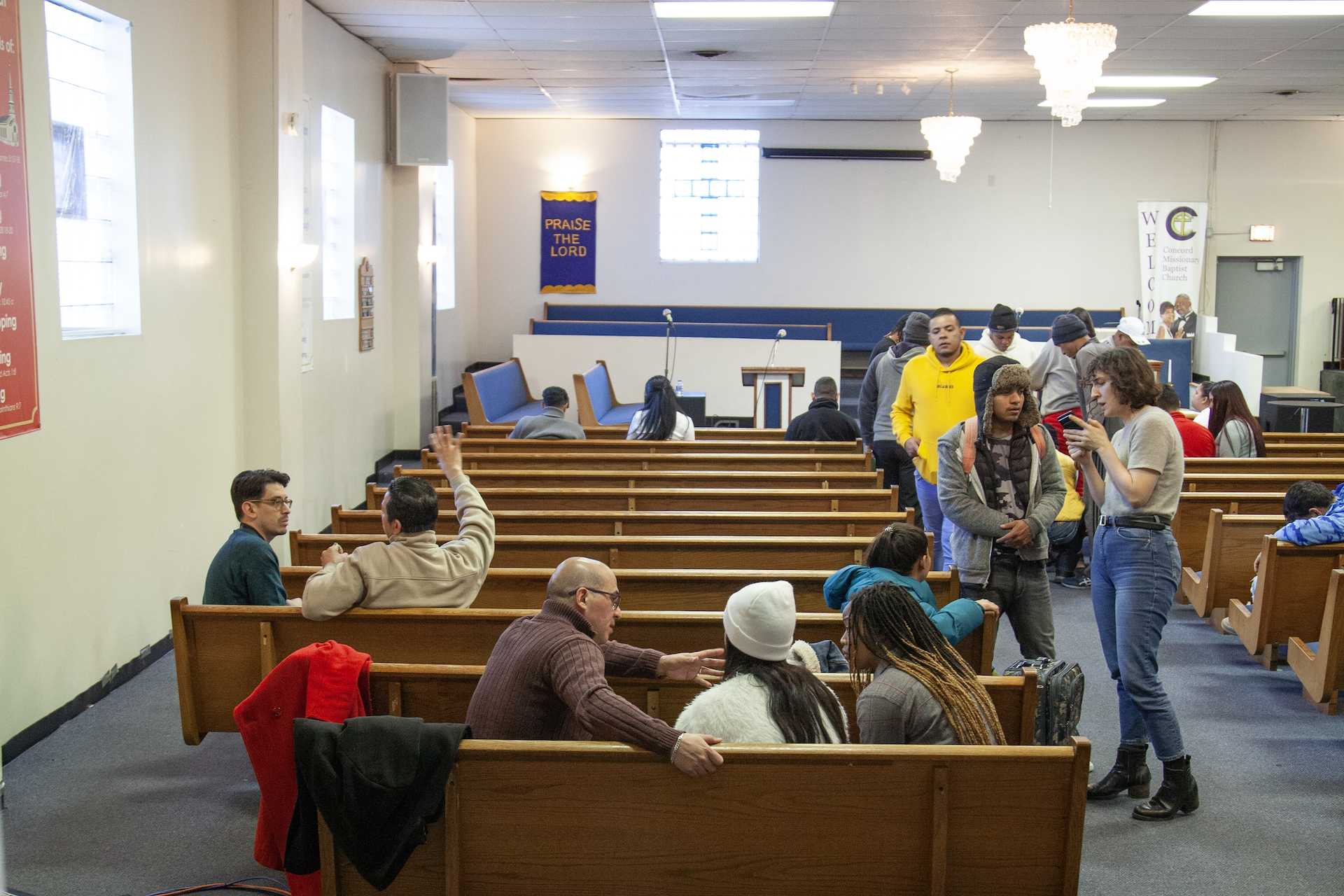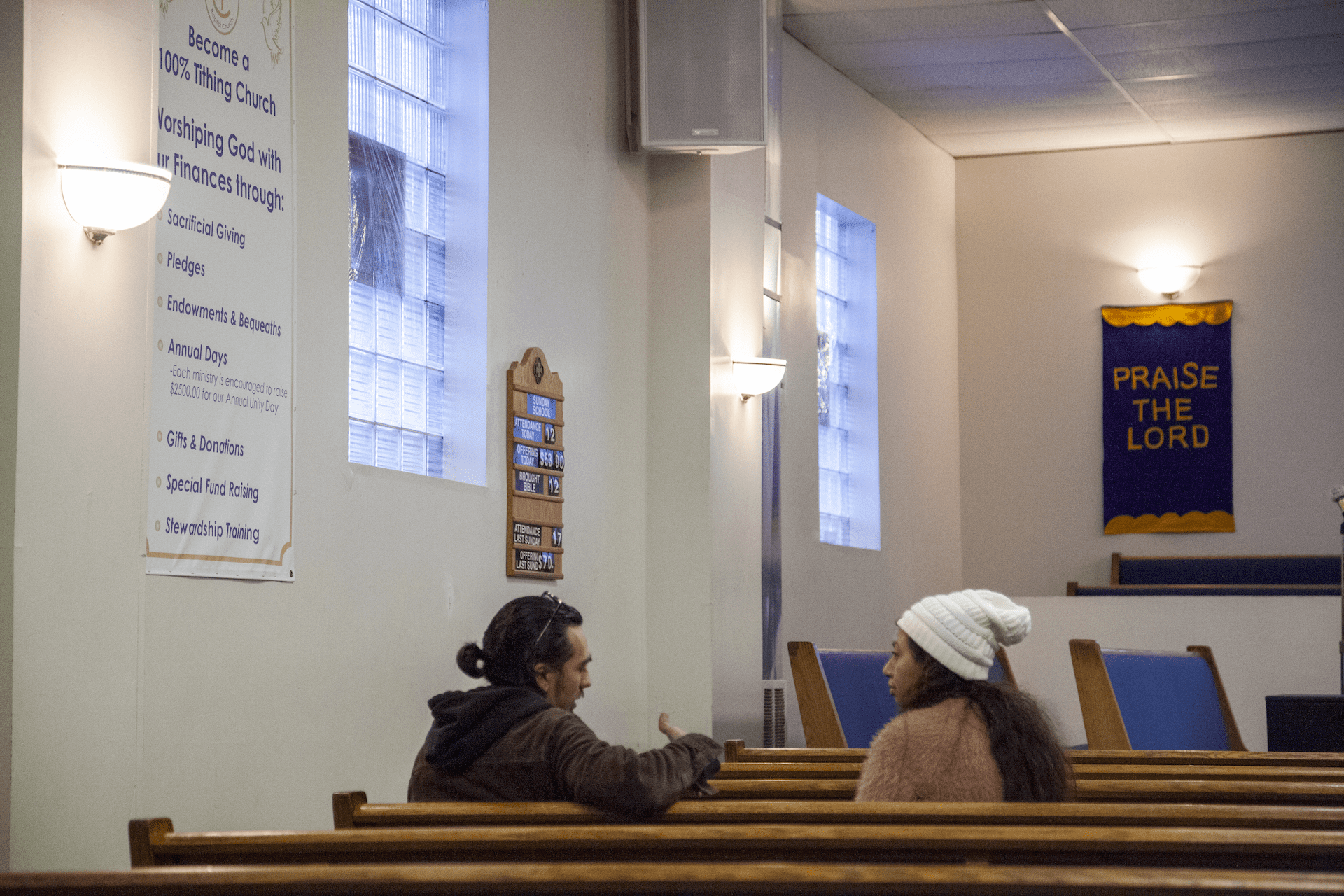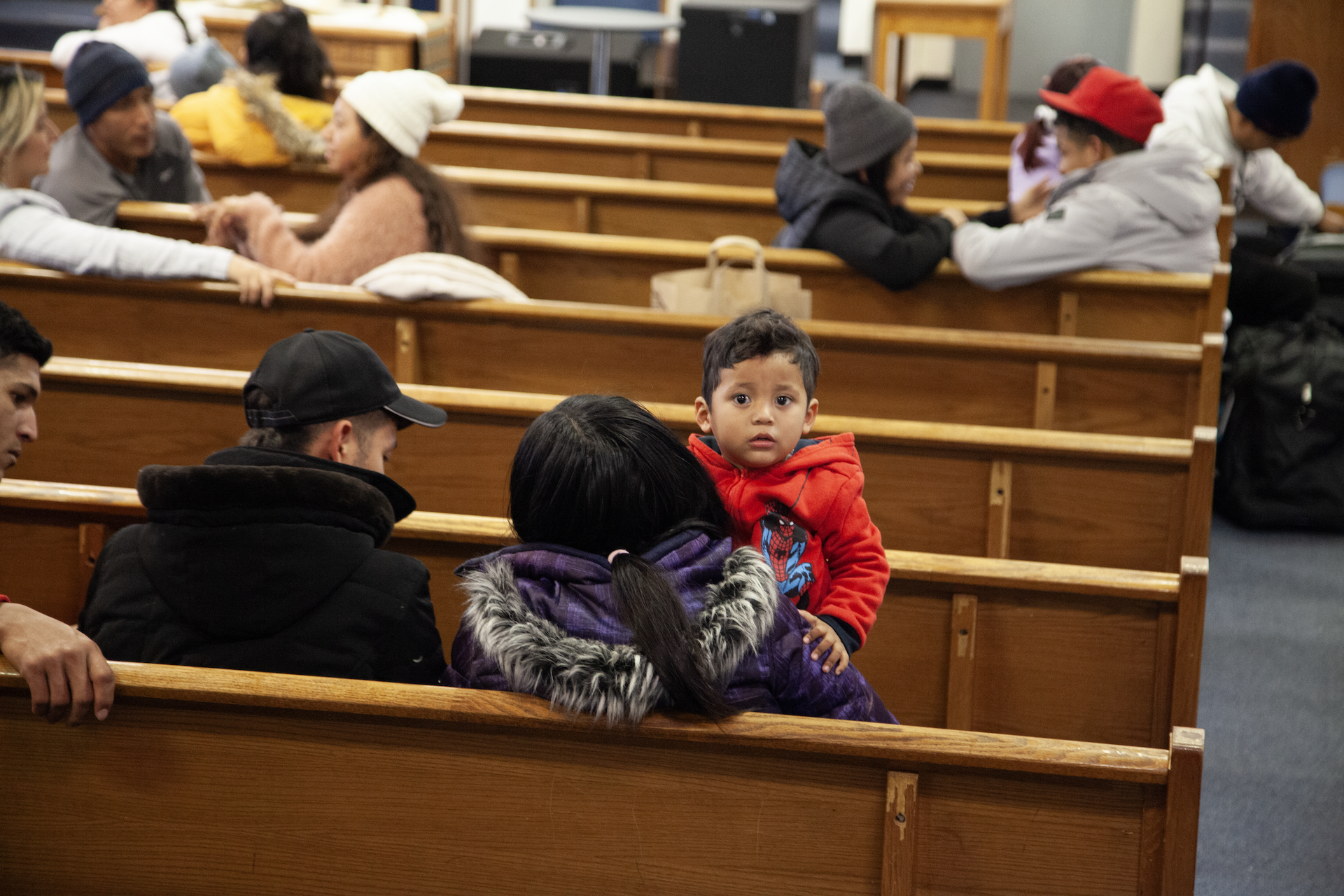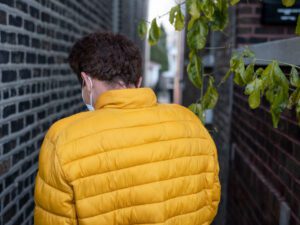 Eli Ramirez/Oficina de la Ciudad
Eli Ramirez/Oficina de la CiudadLos inmigrantes recién llegados dicen que quieren encontrar trabajo y construir una vida estable para sus familias, pero los obstáculos que encuentran hacen que sea extremadamente difícil salir adelante.
Este artículo se publicó originalmente en City Bureau.
Están ansiosos por trabajar. Aportan un sinfín de conocimientos y experiencia, por ejemplo en la enseñanza superior, la banca, la construcción, el diseño de ropa y la mecánica.
Aun así, los inmigrantes recién llegados tienen dificultades para encontrar trabajo.
Como otros inmigrantes antes que ellos, muchos están recurriendo a jornales o trabajos puntuales. El proceso de obtención de la autorización de trabajoSegún dicen, puede resultar turbia y requiere paciencia, sin garantía de que se apruebe nunca.
Noticias que ponen el poder en el punto de mira y a las comunidades en el centro.
Suscríbase a nuestro boletín gratuito y reciba actualizaciones dos veces por semana.
Pero, como dijeron a City Bureau más de una docena de inmigrantes recién llegados, conseguir esa autorización y encontrar trabajo es primordial para afianzarse en Chicago y alcanzar la seguridad económica.
Hasta entonces, muchos encuentran trabajo mediante el boca a boca o esperando en las obras donde los contratistas contratan jornaleros. Cuando encuentran trabajo, a veces les pagan muy por debajo del salario mínimo -o no les pagan nada- y se enfrentan a amenazas e intimidaciones.
Oficina Municipal de Becarios de información cívica visitó dos lugares del barrio de South Side para conectar con inmigrantes recién llegados y conocer mejor su búsqueda de trabajo.
Nota del editor: Las entrevistas se realizaron en español y se tradujeron al inglés. Las entrevistas se han editado y condensado para mayor claridad.
To the English version of this article, haga clic aquí.
Departamento de Arte de Chicago, Pilsen
A pocas manzanas del mayor refugio de emergencia de la ciudad para inmigrantes recién llegados, un tramo de la calle Halsted en Pilsen está lleno de gente. Los padres dejan a sus hijos en un colegio cercano, mientras otros hacen recados o buscan trabajo al ir y venir de su hogar temporal.
Andris Rodríguez, 36 años, es venezolana. Vive en el centro de acogida de Pilsen y sus dos hijos -un niño de 11 años y una niña de 6- van a una escuela cercana. Su hijo está anémico y a ella le preocupa su salud. Rodríguez tiene previsto mudarse a un apartamento con su familia a finales de febrero.
¿Qué le haría sentirse cómodo en Chicago?
Encontrar un trabajo. Quiero poder mantener a mi familia aquí y en Venezuela. Mi madre depende de mí.
¿Cuál era su profesión en Venezuela?
Antes trabajaba en un banco. Cuando mi trabajo dejó de ser suficiente, me dediqué a vender ropa con mi marido. Nos quedamos en Venezuela todo el tiempo que pudimos, pero llegó un momento en que tuvimos que vender nuestras pertenencias para venir a Estados Unidos.
¿Qué le gustaría decirle a la gente que pueda encontrarse con su historia?
Tened empatía. No hemos venido a quitarte nada.
A mis hijos les ha costado adaptarse. Hay días en los que me culpo por todo lo que están pasando mis hijos. Quiero que entiendan que esto será bueno para nosotros en el futuro.
David Cegobia, 30 años, es un trabajador de la construcción de Venezuela. Es cActualmente vive en el centro de acogida de Pilsen. No reúne los requisitos para el Estatus de Protección Temporal, ya que llegó después de la fecha límite del 31 de julio del Departamento de Seguridad Nacional. Espera encontrar trabajo para poder salir del refugio. Sólo ha encontrado trabajo en Chicago cuatro días desde que llegó en diciembre con su mujer y sus dos hijas.
¿Qué métodos utiliza para encontrar trabajo?
Cojo el autobús y voy andando. Siempre que veo obras, pregunto si buscan a alguien. Sólo he trabajado cuatro veces, y me pagaron sólo $25 al día. Se aprovechan de nosotros porque somos inmigrantes.
Otros inmigrantes del albergue me informan de posibles trabajos, pero [las empresas] no me contratan porque no tengo permiso. Mi mujer trabajó un fin de semana en un bar. En Venezuela trabajaba como técnica de uñas. A veces espero fuera del albergue, porque algunos [empresarios] vienen a buscar gente para trabajar.
¿Por qué decidió emigrar a Estados Unidos?
Vine aquí en busca de un futuro mejor para mi familia. Mi salario en Venezuela ni siquiera [cubría el coste de] un cartón de huevos. Pero tuve que dejar atrás a mi padre y a mis hermanos en Venezuela.
¿Por qué quiere trabajar?
Me gustaría trabajar porque quiero contratar a un abogado que me ayude a solicitar asilo permanente. En el albergue hay gestores de casos, pero el proceso no está organizado. Estoy desesperada y la falta de ayuda me estresa.
Robert Araujo, 30 años, es un mecánico venezolano que vive en el centro de acogida de Pilsen con su mujer y su hijo de 7 años. Le aprobaron el TPS y la autorización de trabajo y espera estudiar ingeniería mecánica.
¿Cómo encuentra trabajo?
Algunos [recién llegados] dicen que no pueden trabajar hasta que tengan un permiso de trabajo. Pero si realmente quieres trabajar, harás cualquier cosa. En Denver, trabajé con un mecánico mexicano durante un mes y pude ahorrar para comprarme mis propias herramientas y un coche. Encontré trabajo por mi cuenta publicando mis servicios en las redes sociales y conseguí trabajos de esa manera.
¿Qué le haría sentirse más bienvenido?
Me gustaría tener un trabajo estable y quizá comprar una casa. Pero no se puede estar seguro de un futuro aquí, porque mañana, si un juez o los [funcionarios] de inmigración o el presidente lo deciden, pueden obligarnos a salir a todos.
¿Qué quiere que la gente sepa que no aparece en las noticias?
Si la gente roba zapatos o chaquetas para venderlos, o comida, es por necesidad. No es porque quieran hacerlo, sino por hambre. Si tuvieran permiso para trabajar, no ocurriría. La gente quiere trabajar pero no puede. Hay muchas soluciones aparte de robar y formas de encontrar trabajo, pero hacen cualquier cosa por sus hijos. No ven otra opción.

Iglesia Bautista Misionera Concord, Woodlawn
En la Concord Missionary Baptist Church a principios de febrero, los solicitantes de asilo se reúnen en el gran santuario para el primer servicio dominical en español de la iglesia. Los bancos son de color azul brillante y marrón, y casi la mitad están llenos de personas que acuden por primera vez y se alojan en el refugio municipal cercano, dentro de la Escuela Charter de la Universidad de Chicago, en la calle 63. Después de la misa, muchos se quedaron para recibir equipaje y ropa de invierno de la improvisada tienda gratuita de Concord.
Freddy Manuel Palmar Palmar, 25 años, es un futuro papá en busca de trabajo. Su sueño sería encontrar trabajo en una fábrica de ropa de Chicago, ya que diseñaba vaqueros en Colombia antes de venir a Chicago con su mujer, embarazada de 8 meses. Palmar se ha mudado recientemente a un apartamento y lo que más le preocupa es cómo podrá pagar el alquiler de $1.400 sin un trabajo seguro ni un permiso de trabajo, y con un bebé en camino.
¿Qué haces en el trabajo?
Un poco de todo ahora mismo. Un hombre me está pagando para arreglar su coche y garaje y organizar las cosas. Le estoy ayudando con la construcción y la demolición. Me resulta difícil encontrar un trabajo fijo o incluso un trabajo de día. Estuve siete días seguidos en el [aparcamiento] de Home Depot y no conseguí ni un día [de trabajo].
¿Cuánto le pagan?
Empecé con $100 al día por 10 o 12 horas de trabajo. Ahora cobro $80 al día. No estoy seguro de cuánto me pagarán en el futuro. No puedo negociar, porque soy demasiado fácil de sustituir. Hay demasiada gente [buscando trabajo fuera] de Home Depot como para decir: "Jefe, $80 es demasiado poco para este trabajo".
¿Puede describir su proceso de búsqueda de empleo?
Suelo llegar al Home Depot a las 6 de la mañana. Espero a que alguien venga a ofrecerme un trabajo. Si tengo la suerte de conseguir un trabajo, trabajaré ese día.
¿Cuánto es lo máximo que te han pagado?
Lo máximo que he conseguido es $120 al día, lo cual está bien para mí, pero he sido como una abeja obrera. Otras veces, trabajo muchos días y sólo consigo $50.
¿Cómo era el ambiente de trabajo en estos empleos?
Allí hay gente buena. A veces me dan comida. Hubo una situación en la que un ecuatoriano quería que descargara una caja de cemento de su camión, y trabajé con otro echando cemento. Pasé mucho tiempo trabajando allí y, al final del día, sólo conseguí $50. Era de 7.30 a 17.00, y acabé llorando. Me sentí maltratada.
¿Alguna vez te han amenazado cuando trabajabas en estos jornales?
Hubo una ocasión en la que un tipo quería que descargara algunas cosas de su camión, pero estaba de mal humor, y tuve la sensación de que las cosas no iban bien para este tipo. Entonces se enfadó, me echó del coche e hizo una señal con las manos amenazando con pegarme un tiro. Yo no quería volver al coche, así que el tipo me dejó allí.
¿Cuál sería su trabajo ideal aquí?
Pasé cuatro años en Colombia trabajando para una empresa que diseñaba vaqueros. Sé mucho sobre ellos y me encantaría trabajar en eso. Sé trabajar con todas las máquinas.

Jhovany Jiménez, 42 años, es un profesor de biología de Venezuela. Se marchó porque se enfrentaba a persecución política por participar en protestas tras detectar corrupción en los programas universitarios que dirigía. Trabajó en su propia solicitud de asilo y hace poco se la aprobaron. Vive en el centro de acogida de Woodlawn con su hermano.
¿Quién le ha ayudado durante su estancia en Chicago?
He recibido ayudas a la vivienda del Programa de Caridades Católicas y he encontrado un apartamento. Quiero poder ser independiente y dejar el refugio y estoy en proceso de mudarme. He encontrado muebles y electrodomésticos gratis a través de la iglesia y los chats de grupo. Centro Romero me ayudó a solicitar mi permiso de trabajo en julio.
¿Cómo ha buscado trabajo?
Tengo permiso de trabajo desde agosto. Quiero trabajar para poder contribuir a la nación, a la ciudad. Hace poco conocí a un concejal y le escribí una carta para hacerle saber que, por mi formación, podía participar en el desarrollo de la ciudad. Aún no he recibido respuesta de su oficina.
¿Qué tipo de trabajo quieres hacer?
Tengo tres licenciaturas en ciencias naturales, un posgrado en planificación y evaluación de la educación y un máster en educación. Lo que más me gustaría es trabajar en la elaboración de planes de estudios o en educación. Tengo experiencia como voluntaria en centros de acogida, lo que me gusta, porque tengo un trasfondo social. También soy apta para trabajar con las mismas agencias que ayudan a los inmigrantes, ya que puedo ayudar con los formularios de inmigración.
¿Has podido encontrar trabajos paralelos?
Jale? ¿Actuaciones paralelas? Por supuesto que uno encuentra la manera. He ido a Home Depot y he encontrado algunos trabajos pintando, haciendo demoliciones, mudanzas. También he llevado a gente a sitios. Pude comprarme un coche ahorrando poco a poco. Antes me movía por la ciudad a pie, pero me salían ampollas en los pies de tanto andar. Primero me compré una bicicleta, que me facilitaba los desplazamientos [por trabajo], y ahora tengo un camión.
Alberto Pinto Jaikher, 34 años, antiguo profesor y propietario de una pequeña empresa en Venezuela. El futuro padre llegó a Chicago en enero con su pareja. Sheila Rondón, 20, porque Jaikher tiene un hermano en la ciudad. La pareja vive en el albergue de la University of Chicago Charter School, en Woodlawn.
¿Cuándo llegó a Chicago?
Alberto Pinto Jaikher: Llegamos a Chicago el 8 de enero, pero a Estados Unidos el 2 de enero.
Ahora mismo, no hemos participado en el proceso legal porque no llegamos antes. Cuando entramos [en Chicago], no teníamos prestaciones y no sabíamos cómo conseguir un permiso de trabajo. Me dijeron que primero teníamos que solicitar asilo político. Pero ahora estamos en el albergue esperando a que el gobierno nos ayude con eso.
Vine aquí para trabajar, para esforzarme y adquirir cosas para mí mismo. Por eso creo que la mayoría de la gente quiere un permiso de trabajo. Hay mucha gente en otro refugio que lo está recibiendo. En realidad, en este albergue hemos recibido muy poco.
¿Ha recibido alguna prestación por el bebé?
Sheila Rondón: Me dieron cita para el dentista y una ecografía. Y me dieron cita para la fecha del parto.
APJ: Pero ahora, lo único que pedimos es ayuda. No ayuda con dinero; ayuda con los papeles. Como: "Aquí tienes permiso para trabajar y aquí tienes un empleo". Cuando llegué aquí, alguien me estafó. Fui a trabajar unos días quitando nieve cerca de Casa Esperanza [un centro de acogida en el sur de Chicago]. Y al segundo día me dijeron: "No te vamos a pagar". Me pasé toda la noche y toda la mañana paleando. Cuando le llamé, me dijo que no, que era una cuestión legal. No nos pagaron.
En el estado de Illinois, los contratos verbales son tan vinculantes como los escritos. ¿Sabe si esto le ha ocurrido a alguien más?
APJ: Cerca de Casa Esperanza, sí. Otros tres que trabajaban con la misma persona. No sabría decirte dónde estábamos ni la dirección, porque nos reclutó en el refugio y nos llevó a repartir la sal y a quitar la nieve. Aquí, todas las casas parecen iguales. Trabajamos toda la noche y quería que trabajáramos más de 15 días.
¿Qué espera de su estancia en Chicago?
APJ: La verdad, como dicen, es construir una vida. Nosotros vinimos aquí con otro plan: trabajar y, bueno, ya ves, está embarazada. Y queremos vivir y tener un trabajo estable.
SR: No sabemos si [ese sueño americano] es verdad o mentira. Para ser sinceros, eso es lo que queremos saber.


